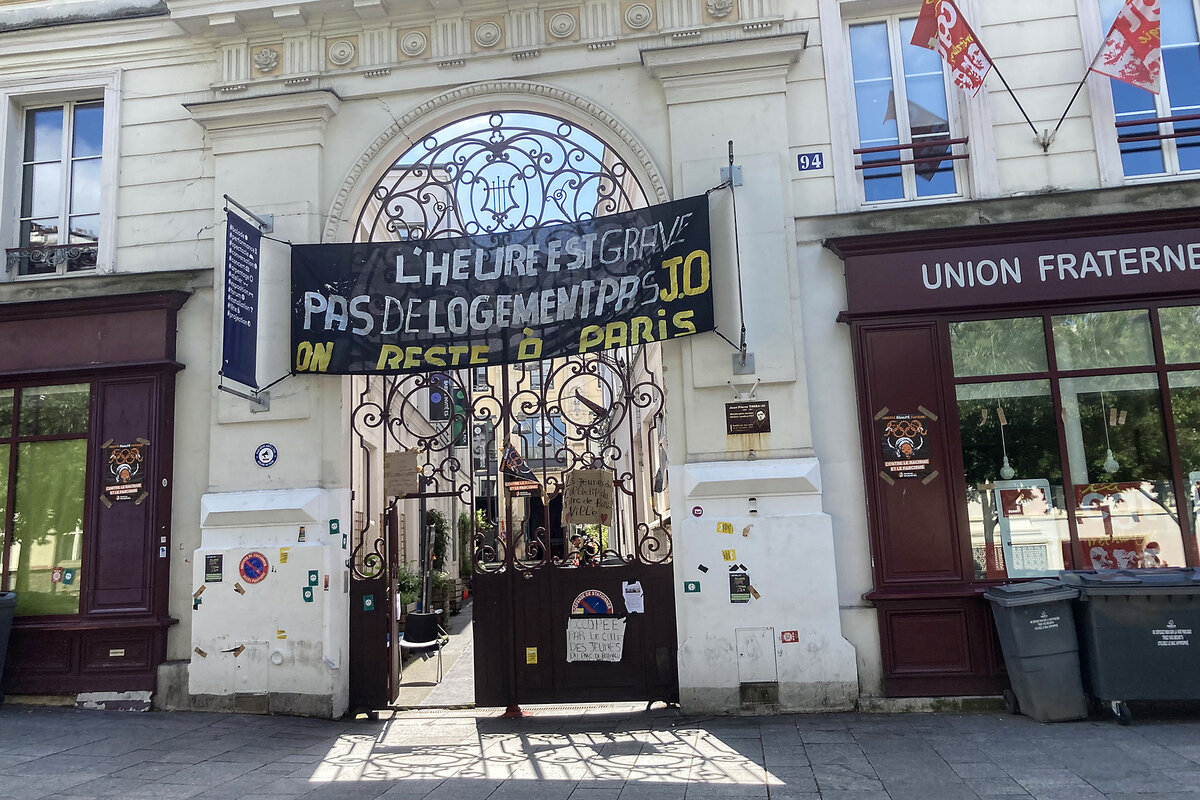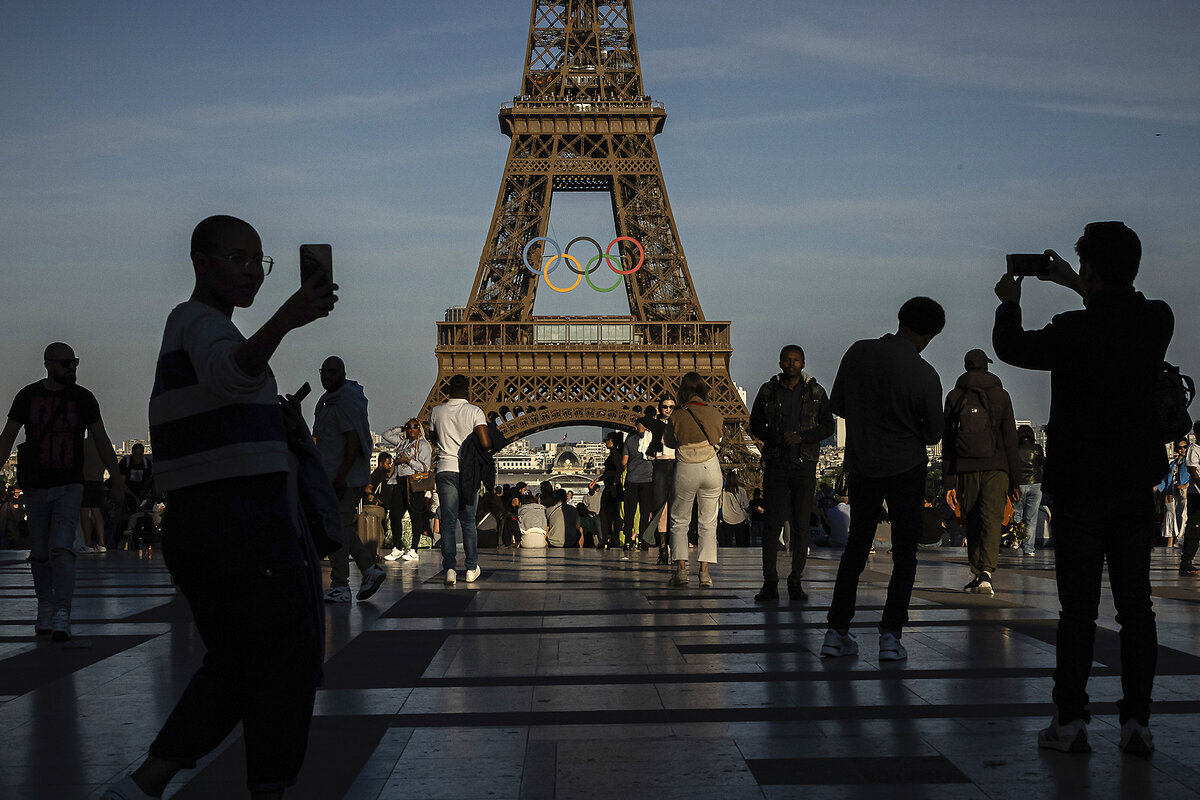Paris wants the Olympics to shine. Where does that leave its homeless people?
Loading...
| Paris
When Alseny left Guinea for a better life in Paris, he never thought he’d end up living on the street. But this spring, victim of a constellation of circumstances, he found himself sleeping under the Pont Marie bridge, along a stretch of the Seine frequented by tourists for its views of the Eiffel Tower.
Then on March 6, police came to remove Alseny and 400 other migrants, busing them to a nearby gymnasium. That’s when he got wind that Paris authorities were planning to send them to one of 10 new temporary shelters in rural France ahead of this summer’s Olympic Games. It was tempting but also a risk: If he left Paris, he’d have to start his request for residency as a minor all over again. (Alseny chose not to share his last name.)
Frustrated by their plight, Alseny and 150 underage migrants took over a Paris cultural center. “The city says they don’t want to see tents and homeless people on the streets during the Olympics, but we’re not delinquents,” Alseny says. “They want to send us away to clean up Paris, but what will we do in the countryside? It’s not a solution.”
Why We Wrote This
With the Paris Olympics set to start soon, the city’s homeless people are being shunted out of sight. Will Paris break the Olympic tradition of failing to improve the lot of the host city’s most vulnerable residents?
City Hall says that the March evictions were prompted by a risk of flooding along the Seine, and that the shelters have been created to take the pressure off the capital. But for several months French nonprofits have denounced what they call a marked increase in evictions of those experiencing homelessness and a “sanitization” of the city ahead of the Games.
Olympic host cities have, in the past, typically found it hard to make a noticeable and lasting difference when it comes to homelessness. Though the Games provide an opportunity for the host city to show off its prosperity and modernity, they also reveal to the world its ability to tackle complicated social issues. And in two weeks, it will be Paris’s turn.
“The Olympics create a window onto a city and it’s all about giving a positive image, which does not include people living on the street,” says Thibaut Besozzi, a sociologist at the Regional Institute of Social Work in the Lorraine region who specializes in homelessness. “But you can’t just send people away and expect the issue [of homelessness] to go away. The question isn’t necessarily what we do with homeless people. It’s how we do things.”
Aspirations vs. realities
When Athens held the first modern Olympic Games in 1896, the event was all about sports. But increasingly, it focuses on city marketing and legacy, say observers.
“The Olympics have always been a way to reflect the dominant aspirations of a society,” says Jacqueline Kennelly, a sociologist at Carleton University in Ottawa, who spent five years studying the effects of the London and Vancouver Olympics on homeless people. “But more and more, Western cities use the Olympics to show themselves as prestigious and tolerant, certainly not places where homeless people get displaced. But also not places where homelessness happens.”
Ahead of the Paris Games, the organizing committee signed a charter of social commitments, which focused on inclusivity, paying fair wages, and reducing carbon emissions. The city also poured millions into creating an Olympic Village in the Paris suburbs that is intended to provide nearly 3,000 housing units to the local community post-Games.
But previous Olympic hosts have been largely unsuccessful in keeping their social commitments.
Ahead of the 2010 Winter Olympics, Vancouver authorities created a network of temporary shelters; they were heavily criticized for the way they kept the homeless out of sight. And one year later, those people were back on the street, says Dr. Kennelly. Apartments constructed for the Olympic Village, intended to provide affordable housing post-Games, have since become too expensive for low-income renters. London experienced a similar fate in 2012 with its East London revamp and its own Olympic Village, whose low-income ambitions have not been realized.
“There is this naivete on the part of authorities, that we can build more housing and somehow it will magically work out,” says Paul Watt, a visiting professor in the department of sociology at the London School of Economics. “But it’s just spinning politics.”
Signs of hope?
In Paris, the challenges have been finding both temporary and long-term housing for the swell of migrants in recent years, and removing makeshift tent camps in a humane manner. The city has also struggled to handle the growing number of people who use crack, of whom are estimated to be homeless or living precariously.
“People on the streets are very eclectic,” says Alexandre Wasieczko, coordinator for the Île-de-France region at Doctors Without Borders. “Some are minors or migrants, some are drug addicts. We shouldn’t be focusing on that, but instead on the fact that living on the street destroys your life.”
Housing advocates say that at the core of Paris’s homelessness issue is simply an extreme lack of housing. An estimated 300,000 people in France are living without permanent accommodation, according to the , and between 6,000 and 12,000 are sleeping on the streets.
But there are hopes that Paris might offer a new model for dealing with homelessness in the future.
Since 2023, the “Revers de la Medaille” coalition of nongovernmental organizations has been working to make sure the Paris Games leave a positive legacy. They work closely with the Paris Organizing Committee and city officials, advocating initiatives to fight homelessness, and volunteers also assist with police-led evacuations to make sure they go smoothly.
An independent study by a research institute at the University of Limoges found that the Paris Olympics could generate up to €11 billion ($12 billion) in net economic benefits by 2034. If some of that money is allocated to housing, it could have an impact that other Olympic hosts have not yet seen.
In March, a delegation from Los Angeles City Hall to examine the city’s homelessness initiatives, as the California city gets ready to be the 2028 Olympic host. But only time will tell whether Paris should be held up as an example, observers say.
“Cities need to ask themselves, if this much public money is going to the Olympics, why is there no accountability as to whether the legacy commitments have been met?” says Dr. Kennelly. “We need to think about why a two-week sporting event gets to take precedence over all other problems.”










